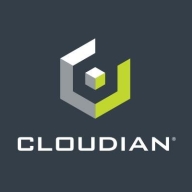


Cloudian HyperStore and Red Hat Ceph Storage compete in the data storage market. Cloudian leads with superior user satisfaction in pricing and customer service, while Red Hat Ceph attracts users with more advanced features despite higher costs.
Features: Cloudian HyperStore offers scalability, S3 compatibility, and easy management. Red Hat Ceph Storage provides integration capabilities, flexibility with various environments, and high-performance storage options.
Room for Improvement: Cloudian HyperStore could enhance integration capabilities, complexity management, and performance in diverse environments. Red Hat Ceph Storage might benefit from simplifying deployment, enhancing user support, and improving cost-effectiveness for smaller organizations.
Ease of Deployment and Customer Service: Cloudian HyperStore features a straightforward deployment process and responsive customer service. Red Hat Ceph Storage requires more technical expertise for deployment but is backed by comprehensive documentation and support resources.
Pricing and ROI: Cloudian HyperStore is cost-effective with favorable ROI for budget-conscious organizations. Red Hat Ceph Storage, despite higher initial costs, offers strong long-term ROI with flexible licensing and performance benefits.
| Product | Market Share (%) |
|---|---|
| Red Hat Ceph Storage | 15.3% |
| Pure Storage FlashBlade | 5.3% |
| Cloudian HyperStore | 2.8% |
| Other | 76.6% |


| Company Size | Count |
|---|---|
| Small Business | 11 |
| Midsize Enterprise | 11 |
| Large Enterprise | 21 |
| Company Size | Count |
|---|---|
| Small Business | 3 |
| Midsize Enterprise | 1 |
| Large Enterprise | 7 |
| Company Size | Count |
|---|---|
| Small Business | 13 |
| Midsize Enterprise | 4 |
| Large Enterprise | 15 |
FlashBlade is the industry’s most advanced scale-out storage for unstructured data, powered by a modern, massively parallel architecture to consolidate complex data silos (like backup appliances and data lakes) and accelerate tomorrow’s discoveries and insights.
Cloudian HyperStore lets you start small and grow to hundreds of petabytes on-premises simply by adding nodes. Leverage the proven interoperability of the industry’s only 100% native S3 API.
We monitor all File and Object Storage reviews to prevent fraudulent reviews and keep review quality high. We do not post reviews by company employees or direct competitors. We validate each review for authenticity via cross-reference with LinkedIn, and personal follow-up with the reviewer when necessary.